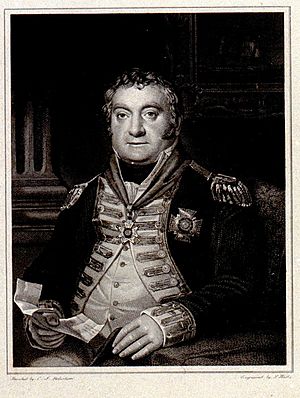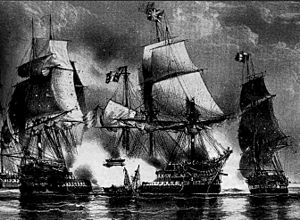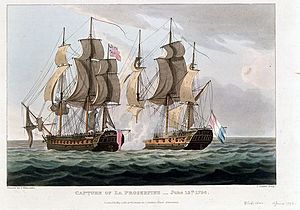Lord Amelius Beauclerk facts for kids
Quick facts for kids
Lord Amelius Beauclerk
|
|
|---|---|

Admiral Lord Amelius Beauclerk, 1771–1846, by C J Robertson, engraved by S Watts
|
|
| Born | 23 May 1771 |
| Died | December 10, 1846 (aged 75) Winchfield House, near Farnborough, Hampshire |
| Allegiance | |
| Service/ |
|
| Years of service | 1782–1846 |
| Rank | Admiral |
| Commands held | HMS Nemesis HMS Juno HMS Dryad HMS Fortunée HMS Majestic HMS Saturn HMS Royal Oak Commander-in-Chief at Lisbon Commander-in-Chief at Plymouth |
| Battles/wars | Napoleonic Wars |
| Awards | Colonel of Marines Knight Grand Cross of the Order of the Bath Knight Grand Cross of the Royal Guelphic Order Fellow of the Royal Society |
Admiral Lord Amelius Beauclerk (born May 23, 1771 – died December 10, 1846) was a very important officer in the Royal Navy. He spent his whole life serving at sea, rising through the ranks to become a full Admiral. He was known for his bravery and skill during a time when Britain was often at war, especially during the Napoleonic Wars.
Contents
Amelius Beauclerk was born on May 23, 1771, into a noble family. His father was Aubrey Beauclerk, 5th Duke of St Albans. Even though he came from a wealthy family, Amelius chose a life at sea.
He joined the navy when he was just 11 years old in June 1782. His first ship was a small cutter called Jackal. Later, he served on Salisbury in Newfoundland and then in the West Indies. He worked hard and became a Lieutenant in 1790.
Becoming a Captain
In 1792, Beauclerk went to the Mediterranean Sea on the frigate Druid. He was promoted to captain on September 16, 1793, by Lord Hood. His first command as captain was Nemesis.
In March 1794, he took command of Juno. His ship was part of a group of ships that were blocking the port of Toulon. Juno was involved in a battle on March 14, 1795, where two French ships, Ça Ira and Censeur, were captured.
Frigate Commands and Victories
After returning to England, Lord Amelius was given command of the frigate Dryad. This ship had 44 guns and 251 crew members. While patrolling the coast of Ireland, on June 13, 1796, he captured the French ship Proserpine. The Proserpine was a strong ship with 42 guns and 348 men.
This was a brilliant victory for Dryad. Beauclerk's ship only lost two men killed and seven wounded, while the Proserpine lost thirty killed and forty-five wounded. He also captured several privateers, which were private ships allowed to attack enemy merchant ships. In 1800, he commanded Fortunée, which operated in the English Channel.
Leading Larger Ships
Over the next ten years, Beauclerk commanded even bigger ships, known as "ships-of-the-line." These included Majestic, Saturn, and Royal Oak, each with 74 guns. They were used in the English Channel.
In 1809, he played a key role in the Walcheren Campaign. He was in charge of landing Lord Chatham's army at Walcheren. He continued to serve as the second-in-command during the operations there.
Becoming an Admiral
On August 1, 1811, Amelius Beauclerk was promoted to rear-admiral. For the next few years, he commanded a squadron in the North Sea. In 1813, he even sailed as far as the North Cape while looking for an American naval officer named Commodore Rogers.
In 1814, he commanded ships in the Basque Roads and helped with talks to stop fighting in that area. He was promoted to vice-admiral on August 12, 1819. From 1824 to 1827, he was the main commander for the British navy in Lisbon and along the coast of Portugal.
He became a full admiral on July 22, 1830. From 1836 to 1839, he was the Commander-in-Chief, Plymouth, which meant he was in charge of the important naval base at Plymouth.
Beauclerk was a very skilled naval officer. Several places in Alaska are named after him, including Port Beauclerc, Point Amelius, and Beauclerc Island. He died, unmarried, at his home in Winchfield House on December 10, 1846.
Honours and Achievements
Lord Amelius Beauclerk received many honours during his long career:
- He became a Fellow of the Royal Society in 1809. This is a very old and respected group for scientists.
- He was given the honorary rank of Colonel of Marines on July 31, 1810.
- He was appointed a Knight Grand Cross of the Order of the Bath (GCB) and a Knight Grand Cross of the Royal Guelphic Order (GCH). These are very high honours given for great service.
- He was also the First and Principal Naval Aide-de-Camp to King William IV from 1839. This meant he was a special assistant to the King for naval matters.
- He was also the hereditary Lord of the Manor of Winchfield, Hampshire.
 | Delilah Pierce |
 | Gordon Parks |
 | Augusta Savage |
 | Charles Ethan Porter |



